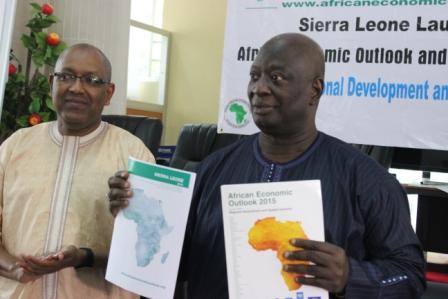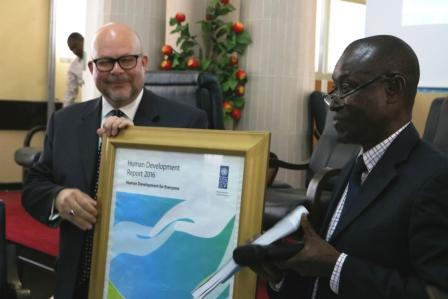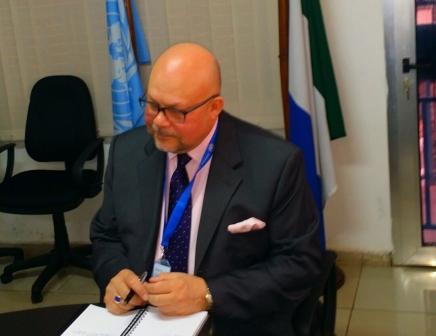Rural areas excluded from economic growth, human development, African Economic Outlook Report shows
Rural areas key for economic growth, reducing poverty and inequality in Sierra Leone.
Freetown, 9 October, 2015 – The African Economic Outlook (AEO) 2015 and Sierra Leone Country Note launched in Sierra Leone last Friday shows that Sierra Leone’s rural areas are seriously excluded from the national economy with a particularly high prevalence of poverty in mineral rich districts like Tonkolili, Moyamba and districts far away from the capital Freetown. The AEO Report and accompanying Sierra Leone Country Note show that the most important spatial nexus in Sierra Leone is the rural/urban with very high prevalence of poverty in rural areas. With no explicit sound spatial economic policies and financial governance essential for poverty reduction, rural areas remain largely excluded from economic growth.
The Africa Economic Outlook Report special theme titled Regional Development and Spatial Inclusion and Sierra Leone Country Note was launched by the Minister of State for Finance and Economic Development in Freetown.
Sierra Leone’s Minister of State, Alhaji F.B.L. Mansaray, who launched the 2015 Africa Economic Outlook and Sierra Leone Country Note on Friday, attended by other senior governed policy analysts, development partners, civil society groups, think tanks and academics, said economic gains and advances in human development made in post-war Sierra Leone has been reversed considerably as a result of Ebola with the economy expected to contract by 21.5% in 2015.
The Minister stated “Despite the grim picture, all is not lost as Sierra Leone will bounce back after Ebola.” Adding that the country’s post-Ebola national economic recovery plans “Will put the country back on track to economic growth and achieving middle income status by 2035 as articulated in the Agenda for Prosperity.”
African Development Bank Resident Representative in Sierra Leone, Dr. Yero Baldeh said that there is no dedicated strategy and policy for spatial inclusion that will deliberately ensure growth centres in rural areas in Sierra Leone and called for “…deliberate policies to reduce inequalities and promote inclusion of rural areas.”
Dr. Baldeh added “The Government should strive to promote the growth of rural centers in order to create a platform for the re-distribution of wealth and development gains to all citizens while at the same time mitigating the negative consequences of rural-urban migration.”
UNDP Country Director, Sudipto Mukerjee noted that Sierra Leone’s diverse regions are key to accelerating economic transformation and spatial inclusion and also calls for deliberate strategies to enhance development in order to “Unlock the potentials of lagging regions and progressively develop local resources.”
Mr. Mukerjee added “People and places should be at the centre of development strategies that create productive jobs and accelerate demographic transition. We have to invest in education and promote intermediary cities to capitalize on urban/rural dynamics. This will make spatial development much more even on the one hand and on the other reduce the diseconomies of urban primacy where Freetown bursts at the seams with sprawling slums, increasing pollution, piling garbage dumps, and increasing risks of floods and other disasters.”
Presentations by Economists from both AfDB and UNDP were followed by cogent discussions from civil society groups and Think Tanks including the Institute of Governance Reform (IGR) led by Mr. Andrew Lavallie and the Centre for Economic Research and capacity Building (CERCB) led by Dr. Samuel Jibao.
UNDP Communications Unit,
Stay with Sierra Express Media, for your trusted place in news!
© 2015, https:. All rights reserved.






